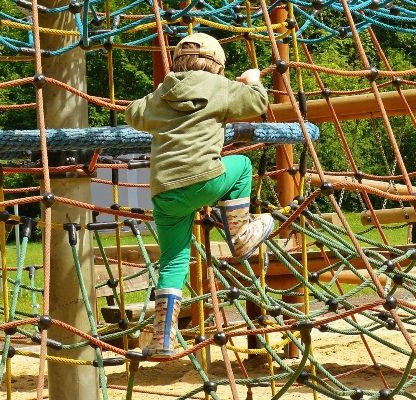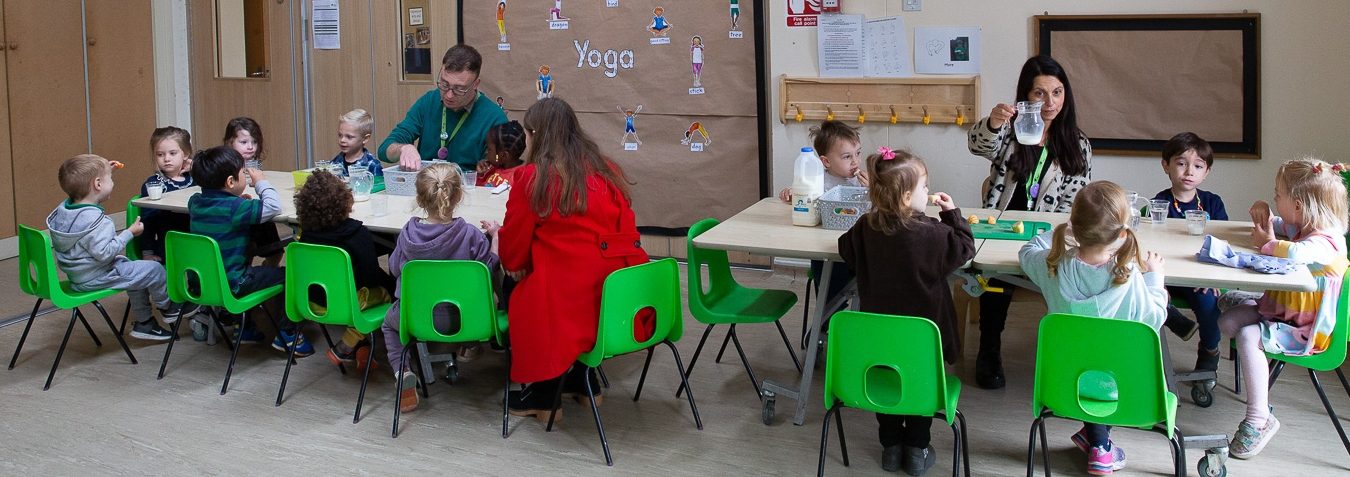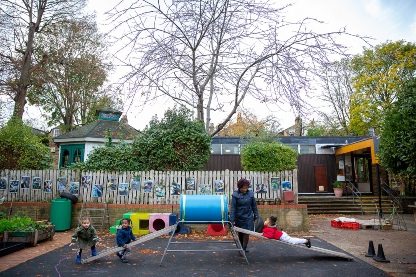Eve Whistler is a nursery teacher who works in a primary school in England. In this article she reflects on her experiences of supporting young children's play. She challenges us to consider how views on the play of neurodivergent children are too often focused on what the child can’t do - rather than what they can do.
Femi's story - aged 4 years
Femi is fascinated by pairs of objects.
He pays attention to certain details - colour, shape and weight are of particular importance.

Once he has found two objects which satisfy his criteria, he will bang them together. He enjoys the noise and vibration as he experiments with altering the force and speed.
There is a particular place he likes to sit - outside, high up on the climbing frame, where he can feel the wind on his face and listen to the patter of the other children below him.
Most days he carefully navigates carrying objects to his favourite spot where he will sit for long periods. As he revels in the pleasure of this activity, a huge smile lights up his face.

Femi chooses to spend most of his day outside. However, occasionally he heads inside to the snack table to request a snack using a visual symbol. Once he has finished, he will return outside, often to explore new objects he has spotted until he finds a pair he is satisfied with.
-
The power of play
This is one of a series of articles from leading practitioners around the world exploring ideas about children's play.
Discover more...nursery children with learning differences are rarely afforded the same freedom to play as neurotypical children...
I often ask myself: do we value play for all children?
As early childhood educators, we can agree that play is fundamental to childhood. Yet is the play of all children ascribed equal value? This is a question I have often grappled with.
As a Froebelian educator, I believe that all children are unique, autonomous learners. Yet in my experience, nursery children with learning differences are rarely afforded the same freedom to play as neurotypical children.
Should we be moving him on?
The play of neurodivergent children is often viewed through a deficit lens, which focuses on what they can’t do, rather than what they can (Murphy, 2022).
Through this lens, Femi’s play would likely be considered restrictive or repetitive. Yet as his teacher, the value of his play was clear to me.
At the very least, Femi was experiencing the joy of childhood, which as a Froebelian, I believe is of value in its own right.
Leaving him to play?
Whilst it was important to me that Femi had equal time to play as his peers, this does not mean that I believe children with learning differences should be left to play alone.
It was through offering freedom with guidance that I was able to find meaningful opportunities to support him to develop his communication skills.
Snack time was a period in the nursery day when all children were required to request a snack from an adult. Using this time to develop Femi’s use of visual symbols meant that his time for free play was not interrupted by interventions aimed at developing these skills.
-
Observing Femi
Femi heads to the snack table where a group of children are sitting eating fruit.
A new staff member who doesn’t know Femi asks the children what they would like. When she comes to Femi, he doesn’t reply. The child sitting next to him steps in to help, “He can’t talk”, she says.
Femi walks over to the wall where there are visual symbols of different snacks which he uses to request what he would like. He hands the staff member a picture of an apple. “That means he wants apple”, the child sitting next to him says.
Later the same day, Femi comes into the classroom from outside appearing upset. He walks over to a staff member. Another child sees that he is crying and hands Femi two spoons, “he wants his spoons”, she says.

-
As can be seen in this observation, I was not the only person supporting Femi. Through being given time to play in the main nursery, many of the children got to know Femi well. Their implicit understanding of his needs meant I had lots of help in advocating for Femi, and other children like him.
References
Murphy, K. (2022) A Guide to SEND in the Early Years. Featherstone.
About the author
Eve Whistler worked in a maintained nursery school in Peckham, London for over 6 years and is now a nursery teacher in a primary school in Cambridgeshire. She gained her MA in Early Childhood Studies at University of Roehampton and it was there that she became inspired by a Froebelian approach to early education.
Eve is currently training as a Froebel Travelling Tutor, joining a team who are providing Froebel Trust Short Courses to early years settings all over the UK. She created this short article about her experiences of working with children and families and the power of play, during the Froebel Trust's Writing Workshop held in Summer 2022.


